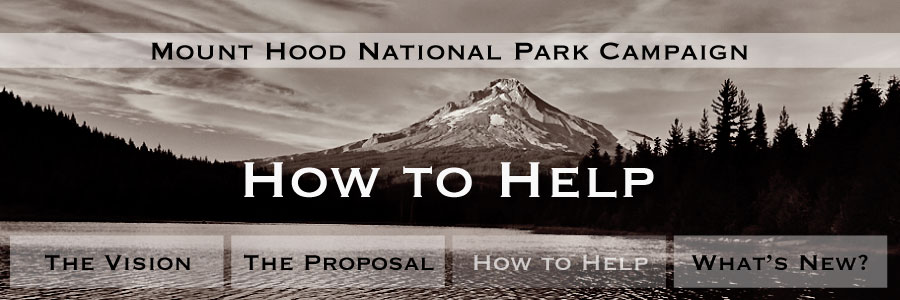
_________________________________________________________
Use these samples to voice your support:
_________________________________________________________
_________________________________________________________
Senator Ron Wyden Dirksen Senate Office Building Washington, DC 20510 Send an e-mail! |
Oregon Congressional
|
Senator Jeff Merkley Dirksen Senate Office Building Washington, DC 20510 Send an e-mail! |
Rep. Earl Blumenauer 2167 Rayburn Office Building Washington, DC 20515 Send an e-mail! |
Rep. Greg Walden 2352 Rayburn Office Building Washington, DC 20515 Send an e-mail! |
Rep. Kurt Schrader 1419 Longworth Office Building Washington, DC 20515 Send an e-mail! |
_________________________________________________________
Sample Letter[Date] [Senator/Congressman] [Address] [Address] Dear [Senator/Congressman]: The Lewis & Clark Wilderness Act is a landmark milestone for protecting Mount Hood and the Columbia Gorge, forever preserving a sizeable part of our natural legacy. But I'm writing now about the places left behind, that could not be protected as wilderness under the new legislation. These places still need a new vision. The remaining places outside our wilderness boundaries are still under threat from a flawed mission of the U.S. Forest Service to simultaneously protect and destroy our forest resources. After a century of failed management, the stewardship of Mount Hood and the Columbia Gorge can be no longer be entrusted to this agency. Instead, we need to finally act to prevent the Forest Service from further damaging the landscapes we have entrusted them to protect. We need Congress to direct the National Park Service to conduct a feasibility study of reclaiming today's Mount Hood National Forest as a new Mount Hood National Park. This is a bold idea, but also one that offers a unique potential to set a new direction for how we think about our national parks: 1. The new century will be about restoration and legacy. This new park would be different from the traditional parks in the system, opening a new era in conservation where tarnished, passed-over national jewels like Mount Hood and the Columbia Gorge would be restored for future generations. A new Mount Hood National Park would become a working laboratory for healing natural ecosystems while building a sustainable relationship between the park and the communities it supports. The new park would serve as the blueprint for how to restore places that never should have been compromised, and would establish a new vision for expanding our national parks in this new century. 2. Mount Hood and the Gorge are of national significance. The striking beauty and unique history of these areas already draws millions of visitors from around the world each year, though the crazy-quilt of state parks and federal lands struggles to meet this demand for tourism. A new Mount Hood National Park would finally weave together these popular destinations, and provide stewardship for the array of historic highways, iconic lodges, pioneer roads, Native Americans sites and unique natural areas. The old Mount Hood Loop highway would continue to be the organizing thread for the new park, and the communities along the loop would become important partners in how the area is managed for both economic and environmental sustainability. 3. We can do things differently in Oregon. Mount Hood and the Columbia Gorge were once a proving ground for new thinking in how to manage public forests for recreation -- we built the nation's first forest campground and recreation trails here, at Eagle Creek, and set the world standard for scenic highways with the Historic Columbia River Highway and Mount Hood Loop. We raised the bar for all other mountain lodges with Timberline Lodge, and led the nation in protecting adjacent rural landscapes through Oregon's landmark land use laws. We can reclaim this tradition of innovation and progressive thinking with new practices for environmental restoration and park planning that could be pioneered as part of restoring the new Mount Hood National Park. It is important to act soon. Despite the steps forward with the Columbia River Gorge Scenic area in 1986, and wilderness protections in 1984 and with the new Lewis and Clark legislation, the area continues to suffer from a combination of heavy visitor use and declining management capacity from the Forest Service. Compounding these pressures is the region's rapidly growing population. Since the Gorge act was signed into law in the 1980s, the Portland region has grown by more than a million residents. Despite this unprecedented growth, the Forest Service has continued a decades-long downward spiral of closing trails and campgrounds, and is falling behind on a huge backlog of deteriorating logging roads. The idea of a national park is not new -- Mount Hood was proposed for national park protection in the 1890s, 1920s and 1930s, and the Columbia Gorge was proposed for national park status as recently as the early 1980s. The Oregonian newspaper recently reminded its readers of the century-old vision for Mount Hood in an editorial supporting a similar proposal for protecting Mount St. Helens as a new national park. But first, we need a feasibility study. Congress needs to direct the National Park Service to conduct a feasibility study of creating a new Mount Hood National Park, but with specific direction to consider how the scars from a century of mismanagement could be healed, and local communities revived as part of the park mission. This is a critical first step that can only come from Congress, and I ask your support in making this happen. Sincerely, [Your Name] [Your Address] [Your E-mail Address] |
_________________________________________________________
_________________________________________________________
